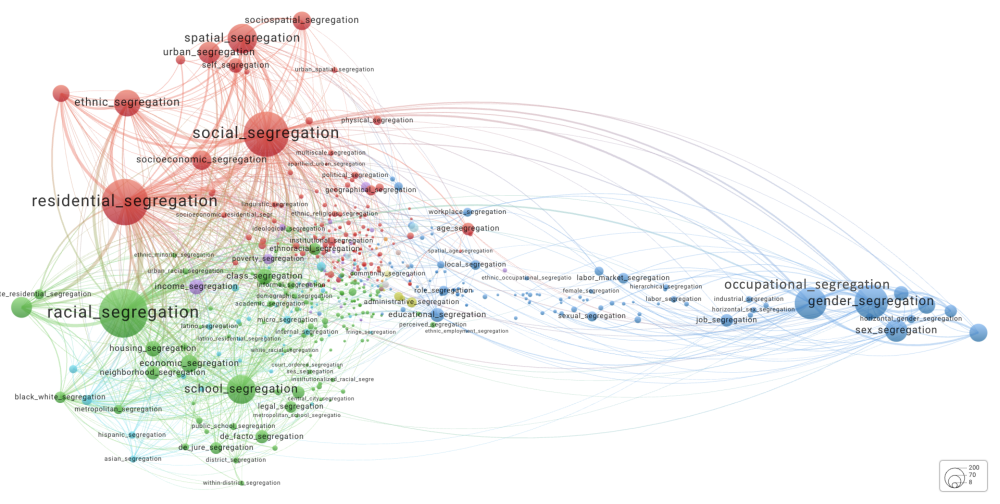Main Page: Difference between revisions
No edit summary |
Nettoworks (talk | contribs) No edit summary |
||
| (22 intermediate revisions by 2 users not shown) | |||
| Line 1: | Line 1: | ||
[[File:segregation- | [[File:Fig6.png|1000x1000px]]<blockquote>The topological landscape of segregation research: The emergent pattern of segregation forms (SFs) and their connections based on co-occurrences in documents in the literature, analysed in 22 Louvain clusters with 577 SFs (Netto et al, 2024). Node sizes indicate degree centrality. Navigate the [https://tinyurl.com/2brf2kts interactive CO network] to zoom in and see its complexity.</blockquote><big>Segregation is a well-known phenomenon that probably impacts billions living in complex societies worldwide. It is a crucial subject across dozens of scientific fields, from Sociology and Urban Studies to Anthropology and Gender Studies. We have found works on segregation in 169 scientific fields.</big> | ||
<big>So what makes segregation such a far-reaching phenomenon, capable of triggering attention in many different areas of knowledge or, more importantly, sweeping into many aspects of social reality? First of all, what is segregation? Definitions may vary. Segregation takes on different forms. It is a multidimensional phenomenon that manifests over people and places across social groups, situations and contexts and through different means and materialities. However, how does segregation manifest across reality? How many forms of segregation exist? Have the sciences engaged with the problem brought all its facets to light?</big> | |||
<big>In our ongoing journey towards understanding and addressing the complexities of segregation, we have developed a means to systematically look into how segregation's different forms and manifestations have been covered across the social sciences and beyond. We are decoding the enormous diversity of segregation forms (SFs) by mapping the landscape of segregation research (SR) over a century, combining network science, automated scientometric instruments and interpretive work. Our overview has revealed over 800 segregation forms explored in the academic literature since the beginning of the 20th Century.</big> | |||
<big>We recognize the importance of a shared vocabulary and a means of helping to organize such an enormous transdisciplinary field. Segregation Wiki serves as a comprehensive resource, offering definitions and explanations of key terms related to segregation in its various forms. As we delve into this critical topic, we aim to foster dialogue, increase awareness, and ultimately work towards creating more inclusive and equitable communities. Whether you're a researcher, student, activist, or simply someone interested in learning more, we invite you to explore this glossary and contribute to deepening the collective understanding of segregation, its incredibly diverse manifestations, and its implications in real situations.</big> | |||
<big>For more information, please consult:</big> | |||
<big>[[Segregation Wiki:About|The Multidisciplinary Landscape of Segregation Research]]</big> <big>and</big> <big>[[An Ontology of Segregation]].</big> | |||
Latest revision as of 17:49, 12 October 2024
The topological landscape of segregation research: The emergent pattern of segregation forms (SFs) and their connections based on co-occurrences in documents in the literature, analysed in 22 Louvain clusters with 577 SFs (Netto et al, 2024). Node sizes indicate degree centrality. Navigate the interactive CO network to zoom in and see its complexity.
Segregation is a well-known phenomenon that probably impacts billions living in complex societies worldwide. It is a crucial subject across dozens of scientific fields, from Sociology and Urban Studies to Anthropology and Gender Studies. We have found works on segregation in 169 scientific fields.
So what makes segregation such a far-reaching phenomenon, capable of triggering attention in many different areas of knowledge or, more importantly, sweeping into many aspects of social reality? First of all, what is segregation? Definitions may vary. Segregation takes on different forms. It is a multidimensional phenomenon that manifests over people and places across social groups, situations and contexts and through different means and materialities. However, how does segregation manifest across reality? How many forms of segregation exist? Have the sciences engaged with the problem brought all its facets to light?
In our ongoing journey towards understanding and addressing the complexities of segregation, we have developed a means to systematically look into how segregation's different forms and manifestations have been covered across the social sciences and beyond. We are decoding the enormous diversity of segregation forms (SFs) by mapping the landscape of segregation research (SR) over a century, combining network science, automated scientometric instruments and interpretive work. Our overview has revealed over 800 segregation forms explored in the academic literature since the beginning of the 20th Century.
We recognize the importance of a shared vocabulary and a means of helping to organize such an enormous transdisciplinary field. Segregation Wiki serves as a comprehensive resource, offering definitions and explanations of key terms related to segregation in its various forms. As we delve into this critical topic, we aim to foster dialogue, increase awareness, and ultimately work towards creating more inclusive and equitable communities. Whether you're a researcher, student, activist, or simply someone interested in learning more, we invite you to explore this glossary and contribute to deepening the collective understanding of segregation, its incredibly diverse manifestations, and its implications in real situations.
For more information, please consult:
The Multidisciplinary Landscape of Segregation Research and An Ontology of Segregation.

